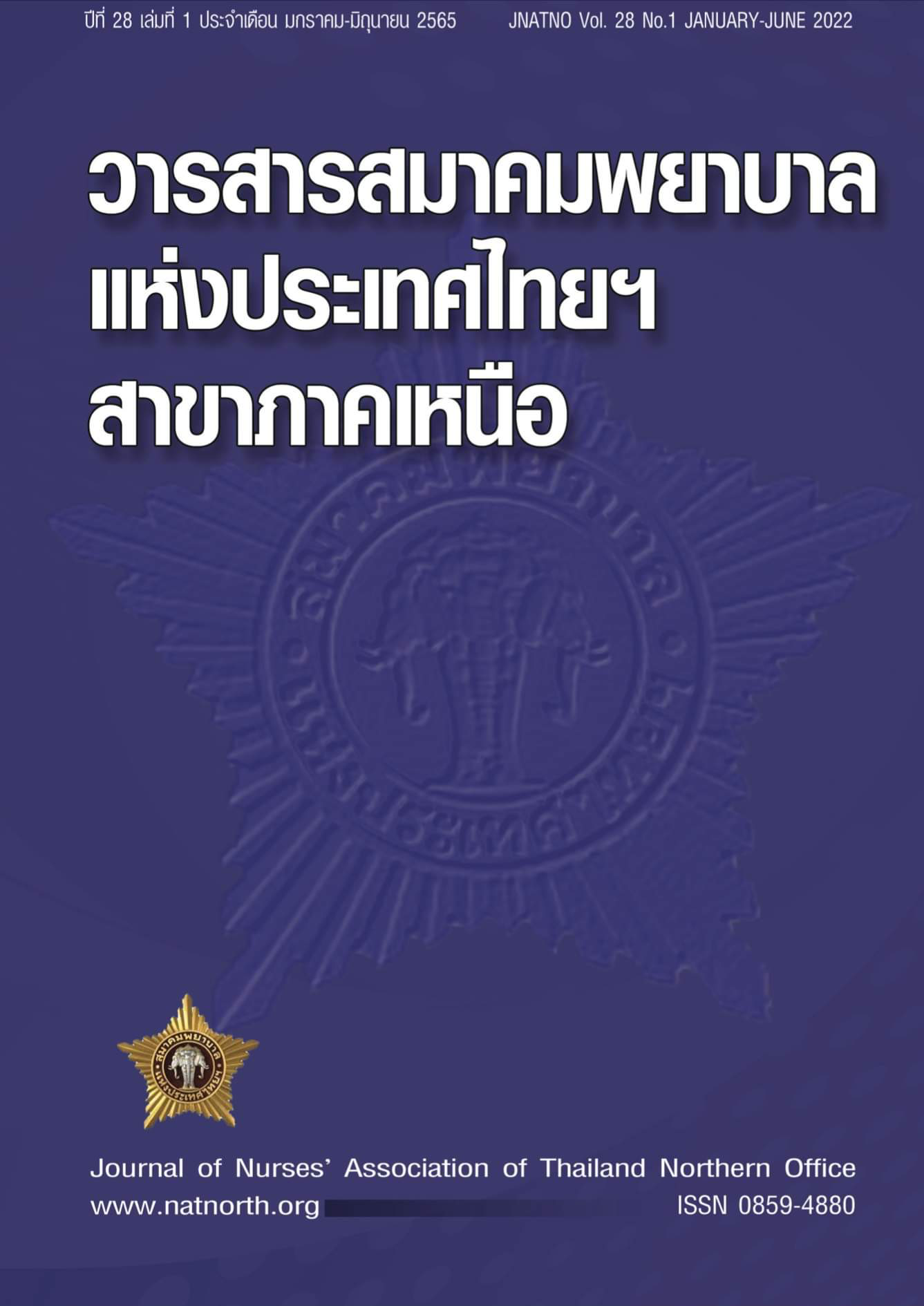Stress and Self-Care Behavior among Nursing Students during COVID-19 Pandemic
Abstract
During the COVID-19 pandemic, there were reports about increasing mental health risks among nursing students. This survey research aimed to study the levels of stress and self-care behavior among nursing students during COVID-19 pandemic. A relationship between stress and self-care behavior was also identified. The samples were 250 nursing students in one nursing college, recruited by stratified random sampling. The research tools comprise a stress test and a self-care behavior assessment form. Data were collected using Line Application. The reliabilities of research tools were .82 and .81, respectively. Data were analyzed using descriptive statistics and Pearson’s product-moment correlation shows that:
The results revealed that 53.6 % of the samples reported no stress, whereas, 24% reported mild stress level. The moderate and severe stress levels among nursing students were equal (11.2%). Seventy-three-point two percent of the participants reported that they practiced good self-care by social distancing, mask-wearing, and hand washing. There was a negative correlation between stress and self-care practice, r = -.159, p< .05.
The results indicated that high levels of stress decreased self-care behaviors among nursing students. Therefore, institutions should provide counseling clinic and promote mental health literacy for students to cope with stress to promote good self-care behaviors during the Covid-19 pandemic.
References
World Health Organization. Mental health and psychosocial considerations during the COVID-19 outbreak, 18 March 2020. appswhoint [Internet]. 2020; Available from: https://apps.who.int/iris/handle/10665/331490
Rajkumar, R.P. COVID-19 and mental health: A review of the existing literature. Asian J Psychiatr 2020;52(102066):102066.
Wang, Y., Li, Y., Jiang, J., Feng, Y., Lu, D., Zhang, W., et al. COVID-19 outbreak–related psychological distress among healthcare trainees: a cross-sectional study in China. BMJ Open 2020;10(10):e041671.
Xiao, H., Zhang, Y., Kong, D., Li, S. & Yang, N. The Effects of Social Support on Sleep Quality of Medical Staff Treating Patients with Coronavirus Disease 2019 (COVID-19) in January and February 2020 in China. Med Sci Monit [Internet]. 2020;26:e923549. Available from: https://www.ncbi.nlm.nih.gov/pubmed/32132521.
Xiao, C. A Novel Approach of Consultation on 2019 Novel Coronavirus (COVID-19)-Related Psychological and Mental Problems: Structured Letter Therapy. Psychiatry Investig 2020;17(2):175–6.
Nicola, M,, Alsafi, Z., Sohrabi, C., Kerwan, A., Al-Jabir, A., Iosifidis, C, et al. The Socio-Economic Implications of the Coronavirus and COVID-19 Pandemic: A Review. Int J Surg Open [Internet]. 2020;78(78):185–93. Available from: https://www.ncbi.nlm.nih.gov/pmc/articles/PMC7162753/.
Social Impact Assessment of COVID-19 in Thailand [Internet]. Unicef.org. 2020. Available from: https://www.unicef.org/thailand/reports/social-impact-assessment-covid-19-thailand.
Luis, E., Bermejo-Martins, E., Martinez, M., Sarrionandia, A., Cortes, C., Oliveros, E.Y., et al. Relationship between self-care activities, stress, and well-being during COVID-19 lockdown: a cross-cultural mediation model. BMJ Open [Internet]. 2021;11(12):e048469. Available from: https://bmjopen.bmj.com/content/11/12/e048469.abstract.
Department of Disease Control Thailand [Internet]. COVID-19 Global [cited 2022 May 22]. Available from: https://ddc.moph.go.th/viralpneumonia/eng/index.php.
Ministry of Higher Education. Announcement subject: Vigilant measures against the spread of Coronavirus (Covid-19) [Internet]. Ops.go.th. 2020 [cited 2022 May 22]. Available from: https://www.ops.go.th/th/main/index.php/news-service/announcement/1983-covid-19.
Tiaprapong, K., Sirikul, A., Krajangmek, C., Duangthongkul, N., Pandam, N., Piya-amornphan, N. Awareness of COVID-19 influences on the wellness of Thai health professional students: An ambulatory assessment during the early “new normal” informing policy. Mechili EA, editor. PLOS ONE 2021;16(6):e0252681.
Singkun, A., Patiwikriwong, P., Chainapong, K. & Weerakhachon, P. Factors Associated with Coronavirus 2019 (COVID-19) Prevention Behaviors among Health Sciences Students of a Higher Education Institution in Yala Province, Thailand. Walailak J Sci Tech 2020;17(9):967–78.
Folkman, S., Lazarus, R.S., Moore, A.D. & Stambrook, M. Ways of coping questionnaire: sampler set: manual, test booklet, scoring key. Ways of coping questionnaire revised. Palo Alto, Ca: Consulting Psychologists; 1988.
Denyes, M.J., Orem, D.E & Bekel, G. Self-Care: A Foundational Science. Nurs Sci Q 2001;14(1):48–54.
Yamane, T. Statistics: an introductory analysis. New York: Harper International Ed; 1973.
Silpakit, O. Srithanya stress scale. J Ment Health Thai [Internet]. 2012;16(3):177–85. Available from: https://he01.tci-thaijo.org/index.php/jmht/article/view/1296.
Amornvit. COVID-19 and Mental Health [Internet]. COVID-19 and Mental Health [cited 2022 May 22]. Available from: https://www.dmh.go.th/test/qtest5/.
Li, Y., Wang, Y., Jiang, J., Valdimarsdóttir, U.A., Fall, K., Fang, F., et al. psychological distress among health professional students during the COVID-19 outbreak. Psychol Med 2020;1–3.
Zeynep T. Nursing Students’ Anxiety Levels and Coping Strategies during the COVID-19 Pandemic. Int Arch Nurs Health Care. 2020;6(4).
Gallego-Gómez, J.I., Campillo-Cano, M., Carrión-Martínez, A., Balanza, S., Rodríguez-González-Moro, M.T., Simonelli-Muñoz, A.J. et al. The COVID-19 Pandemic and Its Impact on Homebound Nursing Students. Int J Environ Res [Internet]. 2020;17(20):7383. Available from: https://www.mdpi.com/1660-4601/17/20/7383/pdf.
Deo, P., Budhathoki, S., Raut, J., Adhikari, B., & Shrestha, J. (2020). Factors Associated with Perceived Stress, Anxiety, Depression, Insomnia during COVID-19 Outbreak among Nursing Students. Int Journal Sci Res 9, 23-39. doi:10.21275/SR20826170002.
Masha’al, D., Rababa, M & Shahrour, G. Distance Learning–Related Stress Among Undergraduate Nursing Students During the COVID-19 Pandemic. J Nurs Educ. 2020;59(12):666–74.
Boromarajonani College of Nursing Chiangmai. Guidelines for managing distance learning in the epidemic situation of the Coronavirus Disease 2019 (COVID-19). Thailand: Boromarajonani College of Nursing Chiangmai; 2020.
Lovrić, R., Farčić, N., Mikšić, Š & Včev, A. Studying During the COVID-19 Pandemic: A Qualitative Inductive Content Analysis of Nursing Students’ Perceptions and Experiences. Educ Sci. 2020;10(7):188.
Ayala, E.E., Winseman, J.S., Johnsen, R.D. & Mason, H.R.C. U.S. medical students who engage in self-care report less stress and higher quality of life. BMC Med Educ 20186;18(1).
Brouwer, K.R., Walmsley, L.A., Parrish, E.M., McCubbin, A.K., Welsh, J.D., Braido, C.E.C et al. Examining the associations between self-care practices and psychological distress among nursing students during the COVID-19 pandemic. Nurse Education Today. 2021 May;100:104864.
Downloads
Published
How to Cite
Issue
Section
License
Copyright (c) 2022 Nurse' Association of Thailand Northern Office

This work is licensed under a Creative Commons Attribution-NonCommercial-NoDerivatives 4.0 International License.
บทความที่ได้รับการตีพิมพ์เป็นลิขสิทธิ์ของสมาคมพยาบาลแห่งประเทศไทยฯ สาขาภาคเหนือ
เนื้อหาและข้อคิดเห็นใดๆ ที่ตีพิมพ์ในวารสารสมาคมพยาบาลฯ ถือเป็นความรับผิดชอบของผู้เขียนเท่านั้น ผู้เขียนบทความต้องศึกษารายละเอียดหลักเกณฑ์การจัดทำต้นฉบับตามที่วารสารกำหนด และเนื้อหาส่วนภาษาอังกฤษต้องได้รับการตรวจสอบจากเจ้าของภาษามาแล้ว


